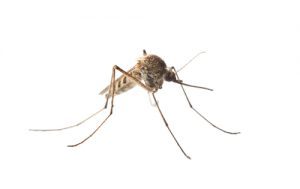In the News –West Nile Virus and Babesiosis Spread by Bites
By Chris Williams on August 21, 2012.
West Nile virus has been in the news a lot lately. This disease is spread by mosquitoes to humans. In certain parts of the country, especially Texas, they are experiencing the worst outbreak ever of the virus, attributed to the unusually warm winter and rainy spring which has meant an increase in mosquitoes. Dallas county alone has had more than 200 cases this year with 10 deaths.
We’re certainly not immune from West Nile virus in the Northeast. In fact, the Massachusetts Dept. of Health and Human Services just announced its first case this year. As of mid-August, mosquitoes infected by West Nile virus have been found in 48 communities and 9 counties in Massachusetts. Infected mosquitoes have also been found in New Hampshire, although no human cases have yet been reported.
 Mosquitoes aren’t the only insects that spread disease to people and pets. Most serious diseases are transmitted when we are bitten by certain insects or ticks that feed on blood and also carry the disease organisms. This group of blood suckers includes mosquitoes and other biting flies, fleas, and various ticks.
Mosquitoes aren’t the only insects that spread disease to people and pets. Most serious diseases are transmitted when we are bitten by certain insects or ticks that feed on blood and also carry the disease organisms. This group of blood suckers includes mosquitoes and other biting flies, fleas, and various ticks.
While West Nile virus gets the bulk of the media attention, in our region we also need to be concerned about another disease–babesiosis. Babesiosis, a parasitic illness that is transmitted by ticks, is endemic in the Northeast and upper Midwest. In 2011, the Centers for Disease Control confirmed 847 cases in the U.S. The bulk of the cases came from seven states: Connecticut, Massachusetts, Minnesota, New Jersey, New York, Rhode Island, and Wisconsin. This is the first time that information about babesiosis has been collected on a national level. CDC says it will take several years of data before we know the trend and whether cases of babesiosis are increasing.
In the Northeast, we’re very familiar with another tick-transmitted disease, Lyme disease. Babesiosis is transmitted mostly by the black-legged tick (deer tick), the same tick that transmits Lyme disease. Most healthy people don’t even develop symptoms after being exposed to babesiosis, but the elderly and people without a spleen are at high risk for life-threatening complications.
The best way to protect yourself from either mosquito-transmitted or tick-transmitted diseases is to avoid infested areas. If you know you are going to be in infested areas, use insect repellent and wear long sleeves and long pants. Eliminate tall grass and standing water near your home. Check yourself for ticks right after an outdoor excursion.